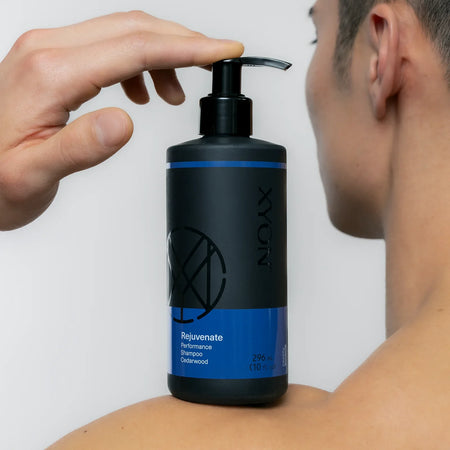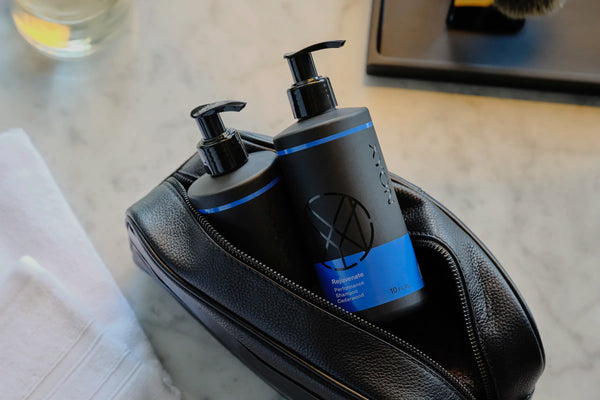Dihydrotestosterone (DHT) is a male sex hormone which can cause hair follicles on the scalp to shrink in men who are genetically susceptible to hair loss. This type of hair loss is commonly called pattern balding.
To slow or prevent male pattern balding, DHT-blocking agents, or products containing DHT-blocking ingredients, can be used. There are a few clinically proven medications which effectively block the production of DHT, but some naturally occurring ingredients have also been shown to have DHT-lowering properties.
Let’s explore some of these ingredients and review the relevant research surrounding them. We also hear from Dr. Christina Han, a board-certified dermatologist and XYON’s medical director on her expert opinion of natural ingredients for hair growth and how you can use natural DHT blockers, alongside your prescribed medication for hair loss.


Our natural anti hair loss shampoo contains DHT blocking red clover extract, rosemary oil, and more
We picked only the best, proven natural ingredients for our non prescription line of products. Chosen and tested by our in house dermatologists
Do natural DHT blockers work for hair loss?
There is some evidence that supports the efficacy of natural ingredients that block DHT. However, it’s important to keep in mind that much of this research is still in its early days. Because of this, it’s generally a good idea to use natural DHT blockers alongside prescribed hair loss medication and this can be a great way to enhance the results you see from your treatment.
However, we can’t totally discount natural DHT blockers and depending on your situation, they could be a great option for you to incorporate into your hair care routine. Dr. Han gave us her take using natural DHT blockers for hair loss:
Natural DHT-blockers can be a valid option for those who are more risk adverse and wish to avoid the use of prescription agents to treat their hair loss. As a whole, they’re generally safe and well-tolerated, but they’re likely to be less effective than tried and tested pharmaceutical options like finasteride.
You could also consider natural DHT blockers if you are experiencing very early signs of hair loss, or if you have a family history of pattern balding and want to get ahead of the game with preventative measures.
Let’s get into the specifics of some of the most common natural DHT blockers you’ll come across and evaluate which are likely to work the best.
Natural DHT blockers for hair loss
Pumpkin seed oil for hair loss
Pumpkin seed oil primarily consists of saturated and non-saturated fats, but it also contains a compound called beta-sitosterol, which can reportedly block the activity of the 5-alpha reductase enzyme (Cabeza et al, 2003). When investigated as a treatment for androgenetic alopecia, pumpkin seed oil supplement increased the mean hair count by 40%, compared to only 10% in the placebo group (Cho et al, 2014). As a topical agent, pumpkin seed oil also promoted hair growth and the research suggested that it could be considered a promising alternative treatment in the future (Hajhashemi et al, 2019).
Green tea for hair
Green tea has long been recognized as a highly beneficial drink, with research pointing to a whole range of potential health benefits from improving cognitive function to helping to prevent heart disease. But did you know that it’s also been tied to hair health?
Green tea is rich in antioxidants which come from compounds called flavanols. One type of flavanol that seems to be significant to hair loss is epigallocatechin gallate (EGCG). A mouse study looking at green tea extract found that EGCG is able to competitively bind to androgen receptors and block the effects of DHT meaning that green tea has the potential to be a useful substance for pattern balding (Siddiqui et al, 2011).
However, it’s more likely that green tea helps hair in other ways. It’s known to improve blood flow to the scalp which helps optimize the supply of oxygen and essential nutrients to the hair follicles, thus promoting healthy hair growth (Heinrich et al, 2011).
Caffeine for hair loss
I know what you’re thinking. You drink coffee every day, but you’re still losing hair so surely caffeine can’t be the magic cure for hair loss?
It’s probably not, but it could help. A majority of the research surrounding caffeine for hair growth argues that it can enhance blood flow to important structures in the scalp, as well as potentially counteract the suppression of hair growth caused by testosterone (Fischer et al, 2007). However, the jury is still out on whether caffeine is considered a DHT-blocking agent.
But this doesn’t mean that it’s not a useful substance for hair and you’ll even find caffeine in our men’s Defend Hair & Scalp serum. The inclusion of this ingredient helps to boost circulation to the scalp and along with other beneficial ingredients, it acts as the perfect adjunct product to use alongside your hair loss medication.
As far as the research goes, there have been a few studies that support caffeine as a hair growth promoting ingredient. For example, when directly compared to minoxidil, caffeine was found to be non-inferior at treating male pattern balding (Dhurat et al, 2017). This is a promising finding for the future of natural hair growth, but more extensive research is needed to determine whether caffeine can and should be used as a stand-alone treatment for hair loss.
In the meantime, stick to your prescribed medication, but you could consider adding this ingredient into your haircare routine alongside.
Does rosemary oil block DHT?
Rosemary oil has been heavily researched as a natural DHT blocking ingredient. Because of this, you’ll notice that it’s included in lots of shampoos and conditioners which are aimed at supporting hair loss.
Rosemary oil has been shown to inhibit approximately 80% of the 5-alpha reductase enzyme (Murata et al, 2012). Additionally, when directly compared to topical minoxidil, researchers found that rosemary oil had similar positive impacts on total hair count (Panahi et al, 2015) and this is likely because of its vasodilating (blood vessel widening) and antimicrobial properties, which help to foster the ideal environment at the scalp for healthy hair growth.
These are some of the reasons that XYON has incorporated rosemary oil into our men's DHT-Blocking Shampoo, which could be the extra boost your hair needs as you progress in your hair regrowth journey.
Saw palmetto for hair
There have been a few studies looking at saw palmetto as a treatment for hair loss and many have demonstrated positive outcomes for male pattern baldness.
For example, one study reported that 60% of participants experienced an improvement in overall hair quality and 27% noticed an improvement in total hair count after taking either oral saw palmetto supplements or using a topical saw palmetto treatment (Evron et al, 2020). Although this preliminary research is promising, when the question is saw palmetto vs finasteride, finasteride takes the win for being clinically backed for its efficacy.
Coconut oil for hair growth
Using coconut oil for hair growth is a method that many people swear by, but is there any evidence to support this and can it help with hair loss?
The gist of the research available has found that it can be good for the strength and protection of the actual hair strands, but it doesn’t appear to do anything to help improve hair loss. In fact, we were unable to find any research to suggest that coconut oil is a DHT blocker, or that it supports scalp health.
So, if you’re looking to strengthen and hydrate your locks, coconut oil might be the one for you. But if you’re struggling with pattern hair loss, coconut oil isn’t the answer.
So, should I add natural DHT blockers to my haircare routine?
Using natural DHT blockers is unlikely to do harm and you might even find that it gives your hair that extra boost it needs. But it’s important not to solely rely on natural remedies if you’re suffering from pattern balding. Whilst they may act as a great supportive therapy, these ingredients are unlikely to cure your hair loss alone and this is why Dr. Han recommends adding them to your routine, alongside your prescribed hair loss medication. Here’s what she recommends:
You can find many shampoos and conditioners on the market that specifically contain DHT-blocking ingredients and this is one of the easiest ways to incorporate them into your haircare routine. Since most people are already regularly using shampoo and conditioner, this doesn’t add any steps to your daily regimen.For those who want to go the extra step, you may wish to add in a scalp care treatment, such a serum. These types of products offer more prolonged contact of the beneficial ingredients with the scalp, so they can be a great natural boost for your hair.
You can find many of these products at XYON, along with other natural ingredients which help to boost hair growth and support a healthy scalp. We’re here to support you on your hair growth journey, whether you’re ready to go the pharmaceutical route or you’re just looking for preventative over-the-counter products. We’ve got you covered.
References:
Cabeza, M., Bratoeff, E., Heuze, I., Ramirez, E., Sanchez, M., Flores, E. (2003). Effect of beta-sitosterol as inhibitor of 5 alpha-reductase in hamster prostate. Proceedings of the Western Pharmacology Society, 46, 153-155. https://pubmed.ncbi.nlm.nih.gov/14699915/
Cho, Y., H., Lee, S.Y., Jeong, D.W., Choi, E.J., Kim, Y.J., Lee, J.G., Yi, Y.H., Cha, H.S. (2014). Effect of pumpkin seed oil on hair growth in men with androgenetic alopecia: a randomized, double blind, placebo-controlled trial. Evidence-Based Complementary and Alternative Medicine: eCAM. https://doi.org/10.1155%2F2014%2F549721
Dhurat, R., Chitallia, J., May, T.W., Jayaraaman, A.M., Madhukara, J., Anandan, S., Vaidya, P., Klenk, A. (2018). An open-label randomized multicenter study assessing the noninferiority of a caffeine-based topical liquid 0.2% versus minoxidil 5% solution in male androgenetic alopecia. Skin Pharmacology and Physiology, 30(6), 298-305. https://doi.org/10.1159/000481141
Evron, E., Juhasz, M., Babadjouni, A., Mesinkovska, N.A. (2020). Natural hair supplement: Friend or foe? Saw palmetto, a systematic review in alopecia. Skin Appendage Disorders, 6(6), 329-337. https://doi.org/10.1159%2F000509905
Hajhashemi, V., Rajabi, P., Mardani, M. (2019). Beneficial effects of pumpkin seed oil as a topical hair growth promoting agent in a mice model. Avicenna Journal of Phytomedicine, 9(6). https://doi.org/10.22038%2FAJP.2019.13463
Heinrich, U., Moore, C.R., Spirt, S.D., Tronnier, H., Stahl, W. (2011). Green tea polyphenols provide photoprotection, increase microcirculation, and modulate skin properties of women. The Journal of Nutrition, 141(6), 1202-1208. https://doi.org/10.3945/jn.110.136465
Fischer, T.W., Hipler, U.C., Elsner, P. (2007). Effect of caffeine and testosterone on the proliferation of human hair follicles in vitro. International Journal of Dermatology, 46(1). https://doi.org/10.1111/j.1365-4632.2007.03119.x
Murata, K., Noguchi, K., Kondo, M., Onishi, M., Watanabe, N., Okamura, K., Matsuda, H. (2012). Promotion of hair growth by Rosmarinus officinalis leaf extract. Phytotherapy Research, 27(2), 212-217. https://doi.org/10.1002/ptr.4712
Panahi, Y., Taghizadeh, M., Marzony, E.T., Sahebkar, A. (2015). Rosemary oil vs minoxidil 2% for the treatment of androgenetic alopecia: a randomized comparative trial. Skinmed, 13(1), 15-21. https://pubmed.ncbi.nlm.nih.gov/25842469/
Siddiqui, I.A., Asim, M., Hafeez, B.B., Adhami, V.M., Tarapore, R.S., Mukthar, H. (2011). Green tea polyphenol EGCG blunts androgen receptor function in prostate cancer. The Journal of the Federation of American Societies for Experimental Biology, 25(4). https://doi.org/10.1096%2Ffj.10-167924



